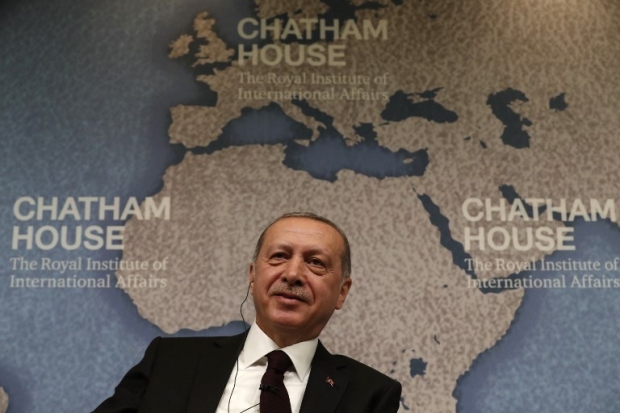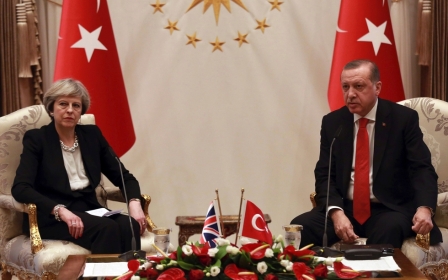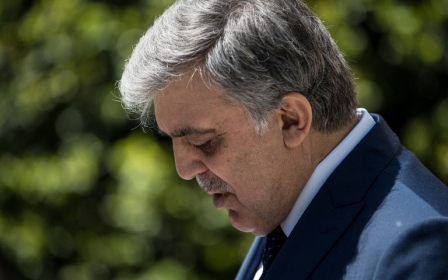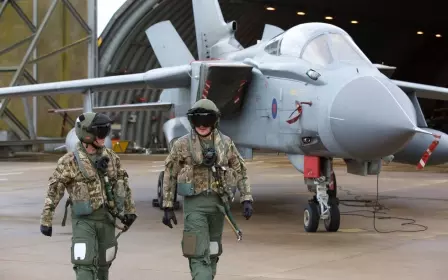Protests in London as Turkish president meets Theresa May
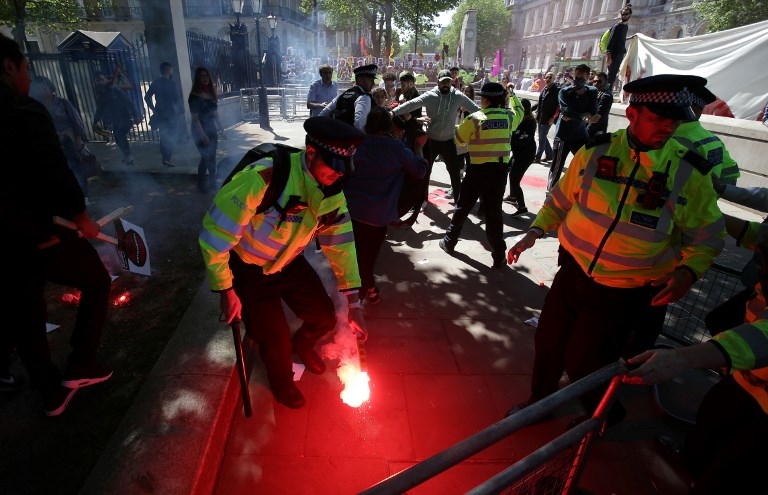
Free speech protestors and Kurdish campaigners rallied outside Downing Street on Tuesday ahead of a meeting between Turkish President Recep Tayyip Erdogan and Prime Minister Theresa May.
A Downing Street spokesman said a "frank discussion" on human rights was on the agenda for the meeting.
We must make it clear to our government here that we do care about the fundamental freedoms - these values that our own country is anchored upon
- Rebecca Vincent, Reporters Without Borders
"We've always been clear that we want Turkey to uphold its international obligations, including respect for freedom of expression and political freedoms," he said.
Erdogan arrived in the UK on Sunday for a three-day visit including meetings with UK politicians, the Queen and Prince Charles.
Protesters briefly held up the president's convoy on Sunday, when he attended an event sponsored by British defence contractor, BAe Systems, outside London where police clashed with pro-Kurdish demonstrators.
The meeting comes as the UK is making a Brexit push to boost trade with Ankara and as Erdogan campaigns for re-election after calling a snap poll for 24 June, bringing the vote forward by a year and a half.
The early election is set to accelerate Turkey's transition to a new presidential system approved in a referendum last year.Critics fear the new executive powers afforded to the president will lead to one-man rule and international pressure has been mounting on Erdogan for his suppression of political dissent.
Meanwhile a state of emergency remains in place in Turkey 22 months after a failed 2016 coup.
Outside Downing Street on Tuesday, dozens of campaigners assembled in a protest organised by freedom of expression groups English PEN, Index On Censorship and Reporters Without Borders (RSF).
RSF says over 100 journalists have been arrested, 140 media outlets shut down and at least 889 press cards rescinded since a crackdown began in 2016.
"We must make it clear to our government here that we do care about the fundamental freedoms - these values that our own country is anchored upon," Reporters Without Borders UK chief Rebecca Vincent told protestors.
Calling for the release of imprisoned journalists, she added: "There is an election coming up."
"Under the state of emergency people do not have full access to independent information, so you now have an electorate that will be going to the polls again after quite a short campaign period without having the full picture."
"In light of that, for President Erdogan to be welcomed - given the red carpet - here in Britain is shameful."
The demonstrators were later joined by a larger group protesting Erdogan's treatment of the Kurds - as well as a handful of counter-protestors seemingly chanting in support of the president.
In a speech at a charity event in London on Sunday, Erdogan painted a different picture, saying that his country is struggling to protect “all the oppressed and otherised” whose “future has been taken away”.
Turkey has taken more than three million Syrian refugees since the country’s civil war started seven years ago and Erdogan said that in European countries, refugees are often "viewed as a threat, not as oppressed people".
It has been seen that many Western states, the so-called protectors of human rights and freedoms, immediately forget these values when the issue is refugees
- Turkish President Recep Tayyip Erdogan
“It has been seen that many Western states, the so-called protectors of human rights and freedoms, immediately forget these values when the issue is refugees,” he said.
While Turkey has cooperated with the EU in tackling the refugee crisis, critics have said that Erdogan's government has arrested or sacked more than 100,000 state workers and members of the military in the wake of the coup attempt, accusing them of links to the Gulen movement, which Ankara blames for the attempted putsch.
In the same speech, the president likened Turkey's fight against the PKK and the Gulenists - which Turks call FETO - to the same fight "against cultural racism and facism that threaten our common future".
"We are also fighting, and will continue to fight, against herds of bloody murderers such as Daesh [Islamic State], FETO, Al-Qaeda, PKK," Erdogan said.
A day before the US embassy was officially opened in Jerusalem, setting off protests that saw 60 Palestinians killed by the Israeli army, Erdogan also underlined that East Jerusalem was the capital of Palestine.
“We will continue to stand with Palestinian people with determination,” he added.
On Tuesday, in reaction to the embassy opening, Turkey recalled its ambassadors to the US and Israel.
Middle East Eye propose une couverture et une analyse indépendantes et incomparables du Moyen-Orient, de l’Afrique du Nord et d’autres régions du monde. Pour en savoir plus sur la reprise de ce contenu et les frais qui s’appliquent, veuillez remplir ce formulaire [en anglais]. Pour en savoir plus sur MEE, cliquez ici [en anglais].


